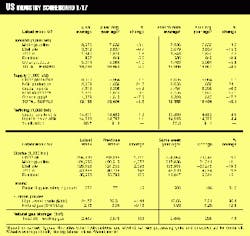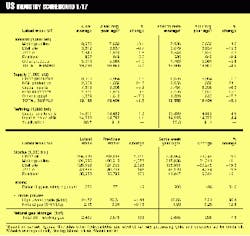OGJ Newsletter
Stakeholder concerns in petroleum industry high-risk areas command center stage this week (see special report beginning on p. 32).
Is Nigeria finally turning the corner on the strife that has disrupted oil production there?
That hopeful sentiment emerged at a retirement dinner for outgoing Chevron Nigeria Chairman George Kirkland last week. Kirkland, being replaced by Ray Wilcox, called on the government to take steps to make Niger Delta natives feel more like stakeholders in oil development in the region by ensuring adequate funding of the Niger Delta Development Commission, which the government of President Olusegun Obasanjo is trying to push through the National Assembly. The Niger Delta, which accounts for 90% of the nation's foreign exchange earnings yet is among the most impoverished and neglected places on earth, was the scene of protests and violence that disrupted oil production to the tune of $1.5 billion in 1999 (see related story, p. 44). Nigerian National Petroleum Corp. Managing Director Jackson Gaius-Obaseki said the relative calm in the Niger Delta in the last few weeks was the result of greater cooperation between the multinationals operating in the country, the government, and the people of the region.
Talisman Energy, another multinational operating in a high-risk area, hopes to soon receive official vindication of its denials of human rights violations related to a major oil field development in Sudan (see related story, p. 38).
Talisman has been staggered by allegations of forced displacement of locals for the project, slave labor, and claims that income from the project is being used to fund the Khartoum government's civil war; it is scrambling to effect damage control measures as stockholder groups shed their stock in outrage over the claims amid criticism from the US state department. The Canadian government is sending a special investigator to probe the allegations and to report his findings to Foreign Affairs Minister Lloyd Axworthy within 2 weeks. Talisman says it welcomes the investigation, which will also cover military use of civilian airstrips at the Greater Nile Oil Project-now producing 155,000 b/d of oil.
Another strife-torn oil exporter, Colombia, reels from yet another scandal in its energy sector. Colombia's Mines and Energy Minister Luis Carlos Valenzuela resigned last week amid charges he pressured state oil firm Ecopetrol to sell gas at below-market levels to Enron unit Promigas for export to Panama. Valenzuela formerly was president of a local firm with a 14% stake in Promigas. He is the third cabinet minister to resign amid corruption probes in the past 6 months from the administration of President Andres Pastrana, who campaigned on an anti-corruption platform. Scandal surrounding an oil minister could not come at a worse time for Colombia, still embroiled in a civil war that has caught the petroleum industry in its cross-hairs (see Journally Speaking, p. 13, and related stories on pp. 29, 30, and 32).
The much ballyhooed OPEC heads of state meeting in Caracas is likely to be postponed because of the horrific mudslides that claimed perhaps tens of thousands of lives in Venezuela last month.
Venezuelan President Hugo Chávez says the possibility of postponing the meeting, slated for March, is being discussed but insists that there will be such a meeting in Caracas. Ch vez's idea for the meeting was intended to further demonstrate OPEC solidarity to the world-the effectiveness of which helped double oil prices in the past year. Because an OPEC ministerial meeting in Caracas was to have been timed to roughly coincide with the heads of state meeting, the postponement of the latter makes the ministerial meeting in Caracas more of a low-key affair now, and that might be a bearish signal for oil markets.
That said, oil prices were on the rise again at presstime last week after Saudi and Venezuelan oil ministers met to discuss whether OPEC's output cuts, targeted to expire in March, would be extended beyond the first quarter. Trader speculation buoyed dated Brent beyond $25/bbl the first time this year.
Seeming to herald continued recovery for energy markets, IPE reported its trade volumes reached their highest level ever in 1999. Total volumes of trades for all contracts climbed to more than 23 million lots, a 20% increase above 1998 levels, representing 21 billion bbl of oil and more than 9 billion therms of natural gas.
Total exchange traded volume is worth $500 billion, IPE said. Wild swings in dated Brent during the year-from $9.90/bbl early in 1999 to a 9-year high of $26.15/bbl in December-accounted for most of the volume.
Ottawa is monitoring the market and a possible sale of its remaining 18% interest in former state oil firm Petro-Canada.
There have been strong rumors that the government is poised to sell its interest, likely worth more than $1 billion (Can.), but an official says Ottawa will wait until it is persuaded it can get the best possible return. The government moved to privatize Petro-Canada a decade ago; about 78% of shares were sold to investors in 1991-95. Restrictions on ownership remain: no single individual or associated group can acquire more than 10% of company voting shares, and nonresidents may not hold more than 25% of voting shares. Petro-Canada thinks proceeds from the sale should be used to set up an environmental fund.
A Washington, DC, appeals court has struck an EPA rule that would have allowed more urban areas to opt into the reformulated gasoline (RFG) program, despite meeting clean air standards.
In their challenge of the rule, API and NPRA claimed EPA exceeded its authority when it opened the RFG program to 80 more areas in 1998.
The court said, "Congress provided for opt-in only for [polluted] areas classified as marginal, moderate, serious, or severe. It meant what it said."
Hopes are high for the start of construction of Papua New Guinea's first commercial-scale oil refinery in the first half of 2000.
Rio de Janeiro-based Interoil will own and operate the planned 500 million kina, 36,000 b/d plant, to be built at Napa Napa, 4 km across the harbor from Port Moresby's central business district. Initially, the plant will supply the domestic market with diesel, gasoline, and kerosine. The project is still seeking equity partners, but negotiations with local interests are well-advanced and financial close is expected early in 2000. The firm signed a 30-year accord with the government that confers tax and market privileges, won environmental approvals, and negotiated a lump sum turnkey contract with construction firm Clough Niugini that includes performance and completion guarantees.
BHP's plans to construct a world-scale fertilizer plant near Geelong, 100 km west of Melbourne, appear to have collapsed.
The $600 million (Aus.) urea plant at Lara was to have been supplied by gas feedstock from the company's Minerva gas field in the offshore Otway basin and transported to the plant by a $200 million pipeline for start-up in 2002.
BHP entered into a feasibility study for the project with fertilizer and chemical company Incitec 2 years ago, but the plan was scrapped just prior to yearend 1999. BHP now is looking for alternative arrangements with other parties to ensure commercial development of Minerva field, discovered 10 km off Port Campbell in 1993.
Some Taiwan petrochemical producers are still feeling the pinch of weakened prices, as the average utilization rate of production capacity among the island's polystyrene (PS) producers stands at less than 60%-the lowest level in more than a decade.
Complicating matters, officials at Taiwan's three leading PS producers-Chi Mei Industrial, Grand Pacific Petrochemical, and Taita Chemical-say the price of feedstock styrene monomer has risen by more than $100/tonne in less than a month. To compensate for this rise, the companies say they will be forced to increase their PS export price to $830-1,050/tonne. However, oversupply has pushed down PS prices on the Far East spot market to $720-50/tonne.
After 12 years of development, Conoco has unveiled plans to begin producing a new petroleum-based carbon fiber.
Using several of its proprietary processes for carbon upgrading, the company will utilize low-value refinery product streams in lieu of higher-cost feeds. The new fiber, says the company, will have unique applications in numerous markets, including electronics, composite materials, plastics, automotive, construction, and transportation. Conoco will make the fiber at a new $125 million, 8 million lb/year plant to be built next to its Ponca City, Okla., refinery starting in second quarter 2000; commercial production is slated to begin in second half 2001.

